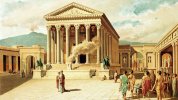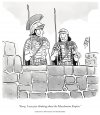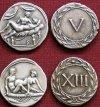-
Sign up or login, and you'll have full access to opportunities of forum.
You are using an out of date browser. It may not display this or other websites correctly.
You should upgrade or use an alternative browser.
You should upgrade or use an alternative browser.
Roman Resources
- Thread starter RacingRodent
- Start date

One of the reasons I put "exquisitely preserved" in quotation marks.

captivecuties
Senator
Look at that hilt!
Loxuru
Graf von Kreuzigung
It is usually said that men are constantly thinking about sex. So, that myth is refuted now!After reading this article
I realized that @Damian,
View attachment 1359414View attachment 1359420
@Jastrow
View attachment 1359412View attachment 1359417
and many other artists have given me many reasons to think of Ancient Rome daily.

Frank Petrexa
Tribune
It is true that Christianity is inseparable from the Roman Empire, and Christianity pervades western culture (with a very male bias). So it is reasonable that movies are fixated on it. The question would be if the people who think about it every day actually know much about it--can give a time line for the emperors, know how the empire evolved.
It is also true that, just like martyr stories (going way back to the early Christians), it is a "safe" way to think about sex--the scandalous Roman Empire.
It is also true, as the article points out, that political thinking at the time of, say, the Federalist Papers was fixated on Rome and Greece. My copy has an index. I looked once. There is a reference to the temple of Apollo, but not a mention of Jesus Christ. God is mentioned once ("he tends to communicate in obscure ways"). Rome and Athens are mentioned all the time. It kind of gives the lie to the idea the United States was founded as a Christian nation.
It is also true that, just like martyr stories (going way back to the early Christians), it is a "safe" way to think about sex--the scandalous Roman Empire.
It is also true, as the article points out, that political thinking at the time of, say, the Federalist Papers was fixated on Rome and Greece. My copy has an index. I looked once. There is a reference to the temple of Apollo, but not a mention of Jesus Christ. God is mentioned once ("he tends to communicate in obscure ways"). Rome and Athens are mentioned all the time. It kind of gives the lie to the idea the United States was founded as a Christian nation.
Last edited:
Another article about why men think so much about the Roman Empire.

Two quite revealing observations:
“It’s my favorite fantasy world, just behind Narnia.”
“Something about a glass of port, a roaring fire, and Edward Gibbon’s elegant prose in The Decline And Fall Of The Roman Empire just makes me cum like a fucking jackhammer every time.”

Two quite revealing observations:
“It’s my favorite fantasy world, just behind Narnia.”
“Something about a glass of port, a roaring fire, and Edward Gibbon’s elegant prose in The Decline And Fall Of The Roman Empire just makes me cum like a fucking jackhammer every time.”
Migoz2
Senator
Another article about why men think so much about the Roman Empire.
View attachment 1359813
Two quite revealing observations:
“It’s my favorite fantasy world, just behind Narnia.”
“Something about a glass of port, a roaring fire, and Edward Gibbon’s elegant prose in The Decline And Fall Of The Roman Empire just makes me cum like a fucking jackhammer every time.”

malins
Stumbling Seeker
Anyway the project to decipher the library of crushed and carbonized papyrus scrolls from Herculaneum has been going on for a while and there have been some updates.
Doing a CT scan of scrolls without opening them and reading them virtually has been done before but the challenge here is that the ink was carbon based and its remains are sitting on carbonized papyrus ...
while for instance the Ein Gedi scroll had ink containing metals, and so was more easily "virtually unrolled" and deciphered. But this is an area where machine learning is really helpful. My guess is that once you have the basics right progress will accelerate rapidly.
A short video introduction
a longer, up to date one here: www.youtube.com/watch?v=w0EsoAbRk1M
this is what a raw original scan looks like www.youtube.com/watch?v=cY5BIxkf5m0&t=10s ... all that ancient text is in there ... but it's obvious it's not an easy task to extract it.
The process explained https://scrollprize.org/tutorial1
Doing a CT scan of scrolls without opening them and reading them virtually has been done before but the challenge here is that the ink was carbon based and its remains are sitting on carbonized papyrus ...
while for instance the Ein Gedi scroll had ink containing metals, and so was more easily "virtually unrolled" and deciphered. But this is an area where machine learning is really helpful. My guess is that once you have the basics right progress will accelerate rapidly.
A short video introduction
a longer, up to date one here: www.youtube.com/watch?v=w0EsoAbRk1M
this is what a raw original scan looks like www.youtube.com/watch?v=cY5BIxkf5m0&t=10s ... all that ancient text is in there ... but it's obvious it's not an easy task to extract it.
The process explained https://scrollprize.org/tutorial1
Interesting to me - I'm in contact with people working on similar kinds of decipherment, and analysis of the inks and papers/ parchments/ papyri of ancient documents in major libraries in UK - though generally they're flat, not rolled up in scrolls. The equipment they're using, and the science involved, leave me wide-eyed with admiration, I just come in when they've made some text (more) legible, helping to identify what script/ language it's in, perhaps even what it says.Anyway the project to decipher the library of crushed and carbonized papyrus scrolls from Herculaneum has been going on for a while and there have been some updates.
Doing a CT scan of scrolls without opening them and reading them virtually has been done before but the challenge here is that the ink was carbon based and its remains are sitting on carbonized papyrus ...
while for instance the Ein Gedi scroll had ink containing metals, and so was more easily "virtually unrolled" and deciphered. But this is an area where machine learning is really helpful. My guess is that once you have the basics right progress will accelerate rapidly.
A short video introduction
a longer, up to date one here: www.youtube.com/watch?v=w0EsoAbRk1M
this is what a raw original scan looks like www.youtube.com/watch?v=cY5BIxkf5m0&t=10s ... all that ancient text is in there ... but it's obvious it's not an easy task to extract it.
The process explained https://scrollprize.org/tutorial1
Frank Petrexa
Tribune
Supposedly Apollo used computers that were primitive both in speed and memory. This is where programming was crucial--people like Margaret Hamilton really had to think about how to write fast code that didn't use a lot of resources. Also, a lot of the math had to be refined into compact formulae by people like Katherine Johnson before it could be coded--you didn't have the resources on the computer to iteratively evaluate things until you got it right. Supposedly Hamilton coded things so that if the CPU was faster than the "peripherals" --the peripheral didn't send an acknowledgement within a specified time--an error message would flash (but the CPU would go on). On the descent to the surface messages kept flashing, freaking out the pilot of the "Eagle". Hamilton had to tell him to ignore them.
Then there's this guy from Northwestern--people like him are what gives economics a bad name. I guess he doesn't realize that the "electric light" today bears no relation at all to Edison's--Edison didn't even know about fluorescent lighting.
https://knowledge.wharton.upenn.edu...owth-productivity-will-underperform-the-past/
Our technology has faltered so much that people now have all kinds of time to run pet hospitals or surf the web or create you tube content, for example, where as when the refrigerator was invented the didn't/
Here is Bill Gates denying he ever said it.
https://www.computerworld.com/artic...-go-away----but-did-gates-really-say-it-.html
Then there's this guy from Northwestern--people like him are what gives economics a bad name. I guess he doesn't realize that the "electric light" today bears no relation at all to Edison's--Edison didn't even know about fluorescent lighting.
https://knowledge.wharton.upenn.edu...owth-productivity-will-underperform-the-past/
Our technology has faltered so much that people now have all kinds of time to run pet hospitals or surf the web or create you tube content, for example, where as when the refrigerator was invented the didn't/
Here is Bill Gates denying he ever said it.
https://www.computerworld.com/artic...-go-away----but-did-gates-really-say-it-.html
Last edited:
Loxuru
Graf von Kreuzigung
As far as I learned, the errors appeared because Buzz Aldrin had switched on (inadvertedly? - he had been involved in the design of the rendez-vous procedures?) the tracking radar for during return. So, during the already demanding procedure of descent, Eagle's radar kept tracking for Columbia, and all this extra information, useless for that moment, overloaded the system.On the descent to the surface messages kept flashing, freaking out the pilot of the "Eagle". Hamilton had to tell him to ignore them.
Frank Petrexa
Tribune
I had never heard of this. They seem to be local in both time and place, like a McDonald's promotion. I assume that making a die to stamp a coin was not straightforward and I doubt metal was that cheap (maybe it came from re-purposed official coins?), so it must have been a higher-end activity, possibly by a single local business. It is a question of why they were preserved all this time if their circulation was so limited. Thanks.
I think Velut Luna mentions them in the brothel episode in Amica, I certainly remember her telling me about them. As the blog says, they may have been tokens used in such establishments, perhaps signalling the kinds of 'services' the client had paid for at the 'reception desk'.
The Wikipedia article saysI think Velut Luna mentions them in the brothel episode in Amica, I certainly remember her telling me about them. As the blog says, they may have been tokens used in such establishments, perhaps signalling the kinds of 'services' the client had paid for at the 'reception desk."
Currently, only Simonetta and Riva are supporters of the brothel token hypothesis,[5] which is also popular with the media . . .
. . . and, apparently, with members of CruxForums.

Ah, but they're the ones with the sexiest names (we've got @riwa here on CF, who knows ... ?)The Wikipedia article says
Currently, only Simonetta and Riva are supporters of the brothel token hypothesis,[5] which is also popular with the media . . .
. . . and, apparently, with members of CruxForums.
Last edited:
Here is Luna's post -I think Velut Luna mentions them in the brothel episode in Amica, I certainly remember her telling me about them. As the blog says, they may have been tokens used in such establishments, perhaps signalling the kinds of 'services' the client had paid for at the 'reception desk'.
https://www.cruxforums.com/xf/threads/amica.3710/post-146192










